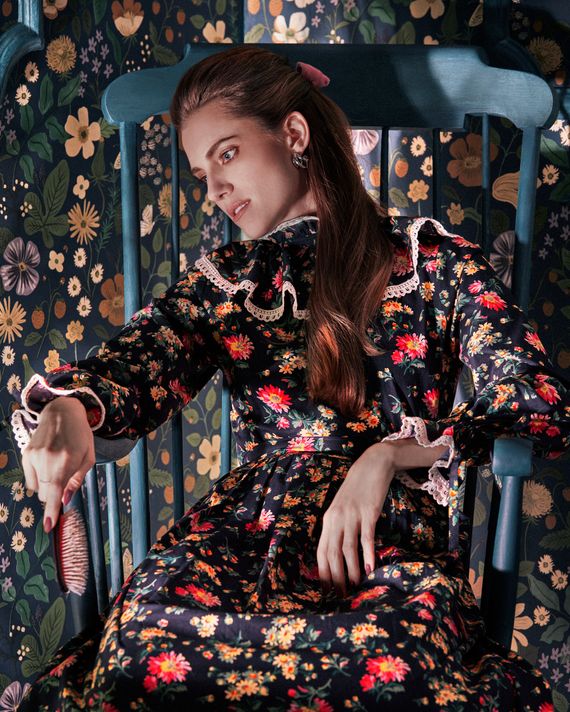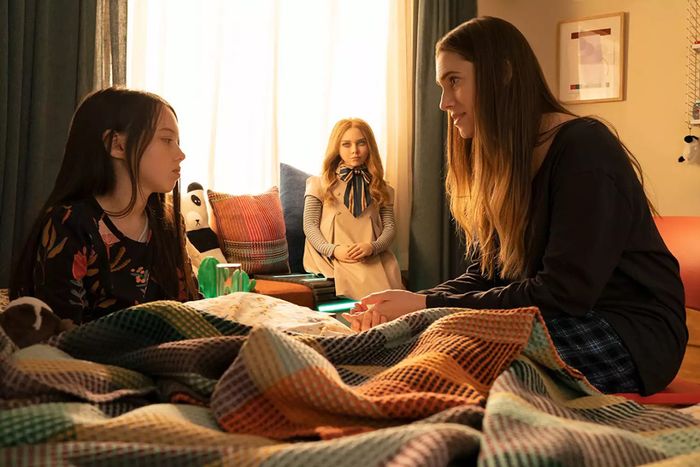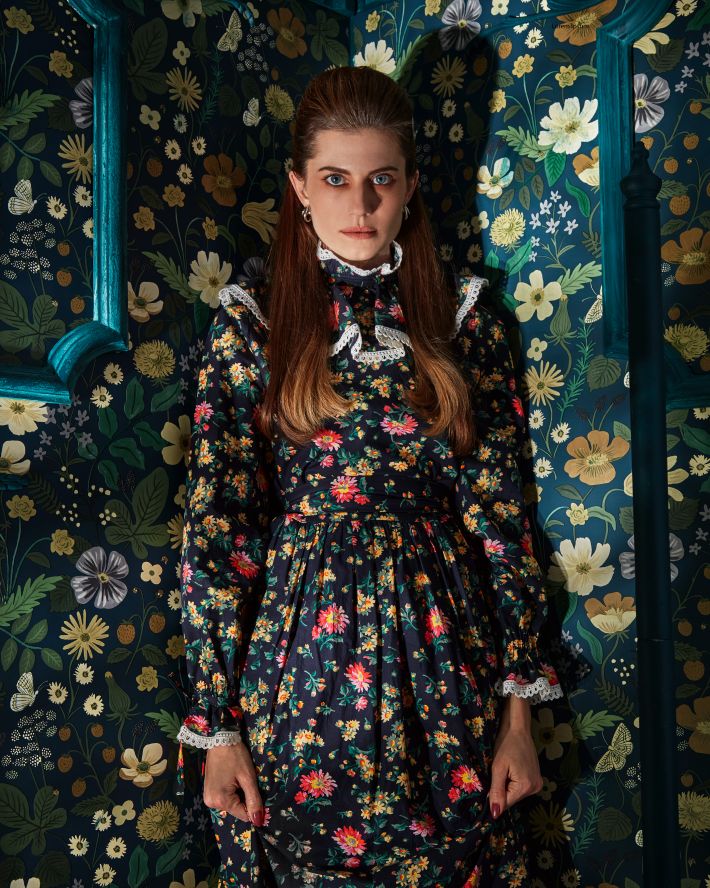
This article was featured in One Great Story, New York’s reading recommendation newsletter. Sign up here to get it nightly.
On a chilly Monday afternoon in November, sequestered in a windowless private dining room at the American Girl Café, which is itself wedged into a windowless basement in midtown’s Rockefeller Plaza, Allison Williams and I are celebrating a birthday. We just aren’t sure whose.
Lit like a Duane Reade and seemingly decorated by a tween inspired by Pinterest photos of corporate break rooms, the space is mostly empty except for two American Girl dolls in little pink high chairs at our table. They are inexplicably set up in a birthday-theme tableau: tiny gifts, party hats, flowers. After Williams and I confirm with each other that it’s neither of our birthdays, we sit down and dutifully put on the pink paper crowns reading CELEBRATE! that have been placed in front of our chairs. Williams stares at the dolls. “What were they doing right before we walked in?” she asks. On a large flat-screen TV, a stop-motion film starring several of the brand’s dolls politely engaging in various wintertime activities plays on a loop.
Our server enters and asks whose birthday we’re celebrating. With sudden gravity and conviction, Williams points at the $115 toy sitting next to her. “It’s this doll’s birthday,” she says with zero traceable irony — traceable being the key word. The server nods kindly at us. Williams then produces the winsome, Ralph Lauren–ad smile that, to a degree, is responsible for her career thus far. It’s a smile she has employed in extreme earnest (as a YouTube singing sensation in her postcollege days, as an impassioned Peter Pan on live TV, and as Kit Snicket in Netflix’s A Series of Unfortunate Events) and as a clever tool of misdirection (in Girls, Get Out, and The Perfection, among others).
“Okay,” the server says. “I’m going to do a little candle for you.”
“Thank you,” says Williams. “We’ll see if she can blow it out.”
Williams and I are lunching at the American Girl Cafe to acknowledge not only the past birth of our inanimate companion, but the imminent birth of her latest movie, M3gan, a horror film about an angelic-looking robot doll who goes on a rather artful murdering spree. Hitting theaters on the now-fraught date of January 6, M3gan is a collaboration between horror megaproducers James Wan and Jason Blum with a screenplay by Akela Cooper, the mind behind 2021’s lunatic parasitic-twin thriller, Malignant. Williams plays Gemma, the murky Frankenstein figure at the film’s center, a brilliant, work-obsessed roboticist at a toy company who is in the midst of creating the titular AI doll (short for Model 3 Generative Android; pronounced like Markle) that is designed to imprint upon, play with, teach, and protect children. After a car accident gives Gemma sole custody of her niece, she decides to test her creation on her new charge — with alarming, HAL 9000–esque consequences.
When the trailer for M3gan dropped in October, the internet instantly latched on to its multitude of Gen-Z dog whistles, which include M3gan pausing mid-murder to hit some TikTok-worthy choreo and catwalking down a dark hallway, sword in hand, to the sounds of Bella Poarch Immediately, Twitter deemed the doll a “gay icon,” cobbling together fan-cam edits set to Britney Spears songs; even Megan Thee Stallion weighed in, tweeting about social media’s previous favorite haunted doll: “Annabelle bitch your OVER.”
From the trailer alone, it isn’t quite clear whether the minds behind M3gan meant for the whole thing to become a campy meme or are offering it up with total sincerity. Williams, who is an executive producer on the film, says the campiness is deliberate: “Making the trailer for this was a very specific process — how do you translate this tone? How do you get M3gan across?”
“And they just get it: to picture her as kind of iconic,” she says of M3gan’s fans. “The memes that they’re making — we can go home, our job is done.”
A tongue-in-cheek, self-aware spirit is concretely established early in the film when Gemma, testing M3gan’s facial expressions for the first time, instructs her to look confused; instead, M3gan puts on a shit-eating grin. “She doesn’t look confused; she looks demented,” says Gemma. Her co-worker shrugs. “It’s your code,” he says. It’s also her face: Williams tells me the doll was designed to resemble her, which is to say a wealthy, Waspy woman with flowing blonde-streaked hair curled gently at the ends and the placidity that comes with belonging everywhere.
Williams has been playing with and against that image — and the astonishingly privileged, raised-by-an-anchorman-in-Connecticut-before-matriculating-at-Yale background it telegraphs — ever since she was cast in Girls as the neurotic, entitled Marnie Michaels, who audiences immediately decided was not a fictional character but an Allison Williams avatar. “Marnie drove people crazy — people couldn’t stand her,” Williams says. “I’d walk in a room and people were like, ‘Keep me away from her. She’s going to pick up a microphone and make a speech that nobody wants to hear.’”
It didn’t help matters that Williams’s offscreen life was just as bourgeois and mannered as Marnie aspired to be: Halfway through the show’s run, Williams married her longtime boyfriend, a CollegeHumor cofounder actually named Ricky Van Veen, in a wedding officiated by Tom Hanks; in early interviews, she gushed about her love of Soho House, singing “Edelweiss” to her dog, and her “obsession with Lululemon exercise thongs.” (For the record, Williams readily admits to being a Samantha.) Search her name on YouTube and you’ll find a series of heartfelt pop and Disney covers, one of which Girls executive producer Judd Apatow stumbled upon in 2011 that instantly convinced him to cast her. (Williams admits to “cringing” at the videos now, adding, in a Marnie-esque aside, that she’d love to “reach through time and say, ‘You’re never going to guess what’s coming.’”)
Over the course of the show’s six-season run, Williams (and creator/star Lena Dunham, plus co-stars Jemima Kirke and Zosia Mamet) constantly and patiently explained in interviews that Girls was satire, not cinema verite. Three seasons in, when the sexually repressed Marnie tries anilingus with her new hipster love interest, a headline the next morning read, “Allison Williams Gets Her Salad Tossed on Last Night’s Episode of Girls.” “I remember that headline very clearly,” says Williams, rolling her eyes. “If that happened to me now, if I was on a show that was that predictably Monday-morning think piece–y, the pressure of that would be really overwhelming in a way that it wasn’t then. Because I didn’t know anything else.”
Though Girls and its central players have undergone a reevaluation in the five years since its finale (Vanity Fair, for one, recently published “Justice for Girls,” which argued that the show’s female cast didn’t deserve the intense scrutiny and often sexist vitriol directed its way), Williams hasn’t quite escaped Marnie’s shadow. “I think people see me as, still, a lot of Marnie. The archetype is probably ‘perfectionist,’ ‘preppy,’ ” she says as we dig into petite bowls of “fancy bow-tie pasta.” Hers is gluten free, something she apologizes for multiple times, perhaps realizing that dietary intolerance plays into the ramrod vibes we’re discussing. At 34, the pigeonholing doesn’t bother her as much — “I mean, I’m wearing a turtleneck,” she deadpans — but she winces at the thought of someone not believing she wasn’t also laughing at the absurdity of Marnie describing her “cultural heritage” as “white Christian woman.”
“It’s horrifying to me. How could you play Marnie for all those years and not be in on the joke?” Williams says. “Just straight-faced singing that Kanye song without knowing that there was anything wrong with it? Listen, if people think that’s who I am — fascinating. What the younger version of me would’ve felt at that suggestion is panic that I can’t tell all of them who I am. But that instinct, of wanting to control that idea of me in this mind of a stranger that I’ll never meet, is something that falls off of you with age but doesn’t disappear entirely. I wish it did!”
To her credit, and unlike many of her privileged peers, Williams is open to discussing what it means to be a “nepo baby” (a term she uses before I even have the chance) with a refreshing lack of defensiveness. Being the daughter of the former NBC anchor Brian Williams is a birthright that afforded her cushy summer jobs, like being a PA on the set of A Prairie Home Companion or Tina Fey’s assistant’s assistant. “All that people are looking for is an acknowledgement that it’s not a level playing field. It’s just unfair. Period, end of the story, and no one’s really working that hard to make it fair. To not acknowledge that me getting started as an actress versus someone with zero connections isn’t the same — it’s ludicrous. It doesn’t take anything away from the work that I’ve done. It just means that it’s not as fun to root for me.”
It also means that there a bizarre number of interviews with Williams and a variety of middle-aged white men likely in her father’s Rolodex (Stephen Colbert, Anderson Cooper) in which she is asked what her father thought of her onscreen sex scenes or to what degree he watched his daughter get plowed on the regular on HBO. It’s an extremely 2015 question (even Vulture asked it) that she answered cheerfully at the time but now concedes “did not disturb me enough.” Williams pauses mid-pasta and looks at the doll next to me. “Has she always been looking at me?” she asks. “Did they move?”
After Girls, Williams decided to use the audience’s expectations to her advantage. Almost everything she has done since has been a considered exercise in leveraging and subverting the idea of “Allison Williams.” In Get Out, she played Rose, a white-supremacist psychopath disguised as a good girlfriend. Then, once she’d persuaded the moviegoing public to be suspicious of her, she exploited that lack of trust to play Charlotte, a brittle and damaged woman who initially seems like the villain but is later revealed to be a complicated heroine, in Netflix’s The Perfection. “A lesson I learned from going from Girls and Peter Pan to Get Out was, like, Oh, we deployed this thing against the audience — and it worked. People come in wary of me, and that is really cool,” she says. Now, she hopes the sense of her is “‘She does weird, interesting, good stuff. So I don’t know which version of her we’re going to get, but let’s go and see.’”
A horror career was not always the post-Girls plan — she’d dreamed of a classic-leading-lady or even a character-actor life — but the genre is where she finds the most complex roles, those that allow her to both reflect and refract her inescapable toxic-white-girl persona. And though she’s thriving in her unexpected niche, she’s still interested in exploring other roles and genres, like, say, a movie musical. “You have to be really careful,” she says, her eyes widening. “I can very easily get on people’s nerves.”
M3gan is, in one reading, a screw-you to the idea that Williams is synonymous with Marnie, Rose, or Charlotte: Fine, this time, the vengeful psychopath with my face actually is my avatar. The film leaves open the question of Gemma’s intentions, her “goodness,” partly because, Williams confirms, there is already “chatter” of a possible sequel. “I think that the audience reevaluating Gemma as the movie goes on is in the movie’s interest — to be constantly checking in and being like, Am I on her side? Am I not on her side?” I ask if she thinks audiences are doing the same thing with her as a public figure. “I don’t know,” she says slowly. “Yeah, maybe. Totally.”
In her personal life, Williams is similarly, albeit unintentionally, dismantling her Marnie-ness: In 2019, she fell in love with her co-star Alexander Dreymon on the set of the poorly reviewed action-thriller Horizon Line, a film that saw her playing yet another “unlikable” white woman, this time a tourist who gets in over her head in Mauritius. Williams divorced her first husband, had a son with Dreymon, and got engaged, seemingly in that order, though she won’t really get into it. She says she hasn’t seen her Girls castmates in years, though she’d happily show up to a reunion. After our interview, she’ll fly to Toronto, where she’s playing, naturally, the daughter of a prominent U.S. Senator in Showtime’s 1950s-set limited series Future Travelers. “I am blissfully happy in my life, and the idea of talking about that, it brings me a ton of joy,” she says, quite literally turning pink when she talks about her new fiancé. “But it also makes me feel panicked. In another life, I’d bore you to tears with my own bliss.”
Our server returns with lemon sorbet and a candle. “Let me close the door,” he says ominously. “We’re going to sing.” He lights the candle, sticks it into the sorbet, and places it in front of us with an expectant look. “Who are we singing to?” he asks. Not missing a beat, Williams points to her still-unnamed doll. “Audrey,” she says. “We’re singing to Audrey.” She and the server immediately launch into a cheerful rendition of “Happy Birthday,” and I join in once I realize I’m the only one feeling even remotely self-conscious. When the song ends, I stare at Audrey, unsure of what to do. Williams, still smiling, picks up the sorbet and blows out Audrey’s tiny candle.
More on 'm3gan'
- Which January at the Movies Was the Most January?
- The 28 Best Movies Released During the January Dead Zone
- Scary Movie Dolls, Ranked by Best-Friend Potential




